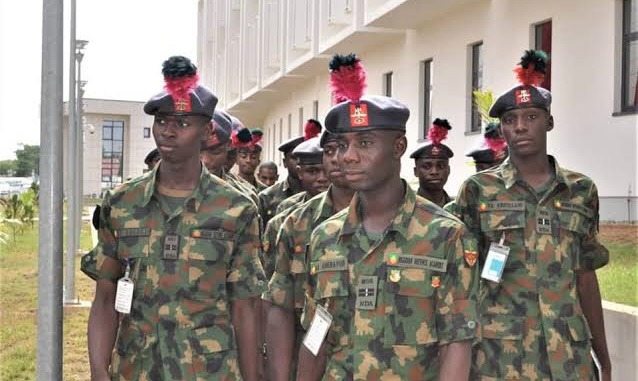Many officers in the Armed Forces may leave after university because of new rules waiting for the president to approve them.
If the president approves the document, officers say it will make it harder for them to stay in the military.
The document shows that the military is considering changing the promotion rules. This would make it harder for DSS officers who join as professionals to be promoted. It would not affect regular service officers commissioned through the NDA.
Chapter 17 of the proposed Revised HTACOS states that promotions up to the Major/Lieutenant Commander/Squadron Leader rank will be based on time. Time requirements include: (a) Cadet to Lt/SLt/Fg Offr. Commissioning these ranks is automatic after five years of training, except on disciplinary grounds.
(b) Lt/SLt/Fg Offr to Capt/Lt(NN)/Flt Lt. Promotion to these ranks is after five years for RCC and seven years for SSCC, DRC, DSSC, and EC/SD/BC in the rank of Lt/SLt/Fg Offr.
From Captain/Lieutenant(NN)/Flight Lieutenant to Major/Lieutenant Commander/Squadron Leader. Promotion to these ranks is after five years for RCC and six years for SSCC, DRC, DSSC, and EC/SD/BC in the rank of Capt./Lt(NN)/Flt Lt.
(d) Additional Requirements. In addition to sub-paragraphs (b) and (c), candidates should:
(1) Have a good PER for three years.
(2) Be recommended by his unit commander.
(3) Pass the promotion exams (up to 3 times) and have the PCS/PJSC or equivalent for Sub-Paragraph c.
(4) Meet any other requirements the Service Council/Board sets.
Senior officers serve five years, while short-service executive officers serve six.
The chapter also said that senior officers are promoted by selection, with three good performance reviews and success in a promotion board. In addition, the following conditions apply:
(a) Promotion to Lt. Col./Cdr./Wg Cdr. To be promoted to Lt. Col./Cdr./Wg Cdr., an officer must:
(1) Have an award like PSC/PSLSC.
(2) Able to deploy for staff/command appointments.
(3) I stayed at least five years for RCC and six years for SSCC, DRC, and EC/SD/BC, ranking as Maj/Lt Cdr/Sqn Ldr.
(4) Other conditions are not mentioned here but are covered by individual service guidelines.
(b) Promotion to Colonel/Captain (NN)/Group Captain. To be promoted to Colonel/Captain (NN)/Group Captain, an officer must:
(1) Have an award like the PSC.
(2) Able to be deployed.
(3) Stayed at least five years for RCC and six years for SSCC and DRC in the rank of Lt Col/Cdr/Wg Cdr.
(4) Meet other conditions introduced by the individual Services.
While this policy may address administrative concerns, some officers say it has disadvantages that could harm the effectiveness, morale, and unity of the armed forces.
The military needs experts in fields like medicine, engineering, and logistics.
Promoting DSS officers too slowly can cause a shortage of leaders in specialized units, making it harder to keep the force ready to respond to new challenges.
Officers are evaluated the same way, no matter where they go to school. This way, promotions are fair and based on each person’s contributions and leadership potential.
The British Army also has a merit-based promotion system. Officers from Sandhurst, Direct Entry, and Late Entry are all subject to the same promotion criteria.
The system ensures promotions are based on leadership qualities, experience, and the ability to take on more responsibility, maintaining fairness and equity.
The proposed policy to increase the time spent on each rank for DSS officers in the Nigerian armed forces is a bad idea.
When this report was filed, the Acting Director of Defence Information, Brigadier General Tukur Gusau, did not respond to questions about the situation.
Mr. Henshaw Ogubike, Director of Information at the Ministry of Defence, did not answer questions about the issue.

 Discuss
More news
Discuss
More news


